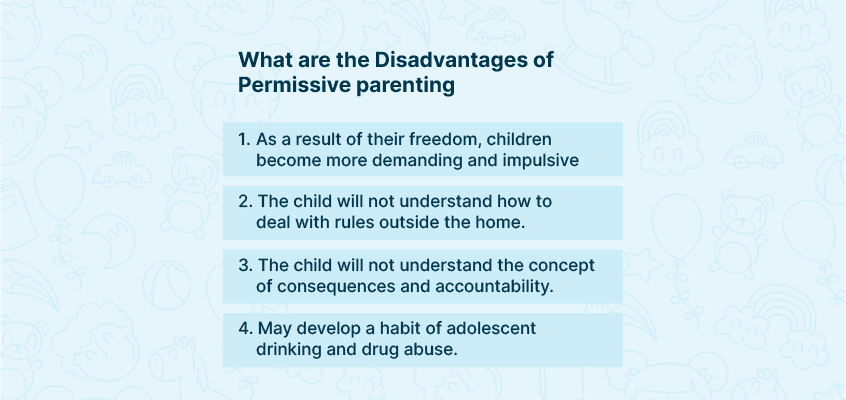Parenting is one of the most challenging tasks in life. When it comes to parenting, there are no hard and fast rules. Parents want the best for their children and raise them in a manner that they believe works best for them. The type of parenting a child can impact them as they grow. We can divide parenting into four distinct styles:
- Authoritative parenting
- Authoritarian parenting
- Permissive parenting
- Uninvolved parenting
Let’s look at two parenting styles at opposite ends of the spectrum: authoritative parenting and permissive parenting.
Our Wellness Programs
What is Authoritative parenting
- Parents set clear boundaries and specific rules, limits, and guidelines.
- This style expects the child to follow the rules and meet reasonable demands.
- Parents are responsive and show warmth, control, and affection to their children.
- Parents have high expectations for their children’s behaviour and discipline.
- Parents discipline by talking to the child and guiding them based on the situation and needs.
- They encourage their child to speak up during family discussions, listen to their child, and value their opinion.
- Parents validate their children’s feelings while emphasising that adults are ultimately in charge.
- They are not harsh or demanding parents, but they want to teach discipline to their children. Establishing ground rules teaches them responsibility and discipline.
What are the advantages of Authoritative Parenting?
- The child will excel in school, have excellent social skills, and have high self-esteem.
- This style views parents as role models for their children.
- The child will respect authority.
- The child will respect rules and regulations and follow them in all aspects of life.
- The child is well-mannered and knows how to behave in public.
- The child develops to become more self-sufficient.
- The child grows to be more mature to form positive relationships with family, friends, and coworkers.
What are the disadvantages of Authoritative Parenting?
- While it is the healthiest and most recommended method of raising children, it is also one of the most difficult for both parents and children.
- When the children see other children’s freedom, they may feel left out.
- Fear of breaking the rules and possibly learning to lie.
What are examples of Authoritative Parenting?
Anna’s authoritative parents respect her needs but believe that she needs freedom within limits. Anna is free to watch movies and play games but only for a set time limit. She is allowed to eat pizza but only on Sundays. When she wants to tell her opinion, her parents listen to her and then lay down the rules in a conflict. Parents provide all the encouragement and support she needs to learn and guidance when encountering difficulties. Anna learns to deal with adversity and to be self-sufficient. She can also express herself correctly and develops into an understanding, mature individual.
Looking for services related to this subject? Get in touch with these experts today!!
Experts

Kirti Bajpai

India
Psychologist
Experience: 5 years

Mansi Chawla

India
Psychologist
Experience: 12 years

Sapna Zarwal

India
Psychologist
Experience: 19 years

Davis Emerson

India
Psychologist
Experience: 6 years

Vasudha Agarwal

India
Psychologist
Experience: 13 years

Tulika Chandra

India
Psychologist
Experience: 10 years
What is Permissive Parenting?
- Parents allow their children to make decisions and do not stop them. The children are free to do whatever they want.
- Parents’ demands are fewer, but their responsiveness is high.
- Children are free to set their boundaries.
- The child is not being controlled or restrained.
- Parents take on the role of a friend rather than a parent.
- Parents rarely punish the child.
- Parents encourage their children to talk about their problems, but they make little effort to discourage bad behaviour or poor choices.
- The child’s happiness is essential to the parents, so no rules are established, and the children learn that they do not need to follow the directions to succeed.
What are the advantages of Permissive Parenting?
- Parents credit permissive parenting for raising an independent and decision-making adult, as they grew them without boundaries as a child.
What are the disadvantages of Permissive Parenting?
- Although loving and nurturing, permissive parenting is not a recommended parenting style.
- As a result of their freedom, children become more demanding and impulsive.
- The child does not distinguish between adults and children and exhibits inappropriate behaviour.
- The child will not understand how to deal with rules outside the home.
- The child will not understand the concept of consequences and accountability.
- The child does not learn to live within boundaries and breaks the rules when they grow up.
- When a child reaches adulthood, they do not understand how to work as part of a team, which is essential in today’s world.
- May develop a habit of adolescent drinking and drug abuse.
What are the examples of Permissive Parenting?
Joy’s parents adore him and believe that they should provide for all his wishes. They give him complete freedom and never say ‘no’ to his needs. Joy has absolute authority over his parents and can get whatever he desires. Whenever he wants pizza, he gets it. He is permitted to watch late-night movies or play video games. Joy is a child who has no restrictions from his parents and grows up doing whatever he thinks is correct. He does not learn to adjust or keep control over his emotions. Joy turns out to be an unsuccessful individual since he got everything without restrictions in his childhood. As Joy grows older, it becomes hard for him to accept rejections. He thus stays immature, is less considerate to others, and loses sight of his limitations.
Inference
Authoritative parenting demonstrates a strong sense of warmth and high control over the child. Permissive parents possess a high level of heat and a low level of control. Unlike permissive parents, authoritative parents do not tolerate bad behaviour in their children but take a firm stand and expect them to be responsible. Setting limits and boundaries for your child is the most loving thing you can do for them.
So, authoritative parenting is the most successful, recommended parenting style and has produced the best results in children. Traditional parents raise successful children. The child matures into a more secure, responsible adult who can make his own decisions and is not resistant to change.
There is no one-size-fits-all approach that works for everyone. Parents should do what is best for their children in any situation, as long as they do not neglect or abuse them. The key is to be assertive, consistent, and to be firm. Different stages of child development must be understood so that our limits consider our children’s ability and safety. The child should grow up to be a responsible and contributing member of society.
















